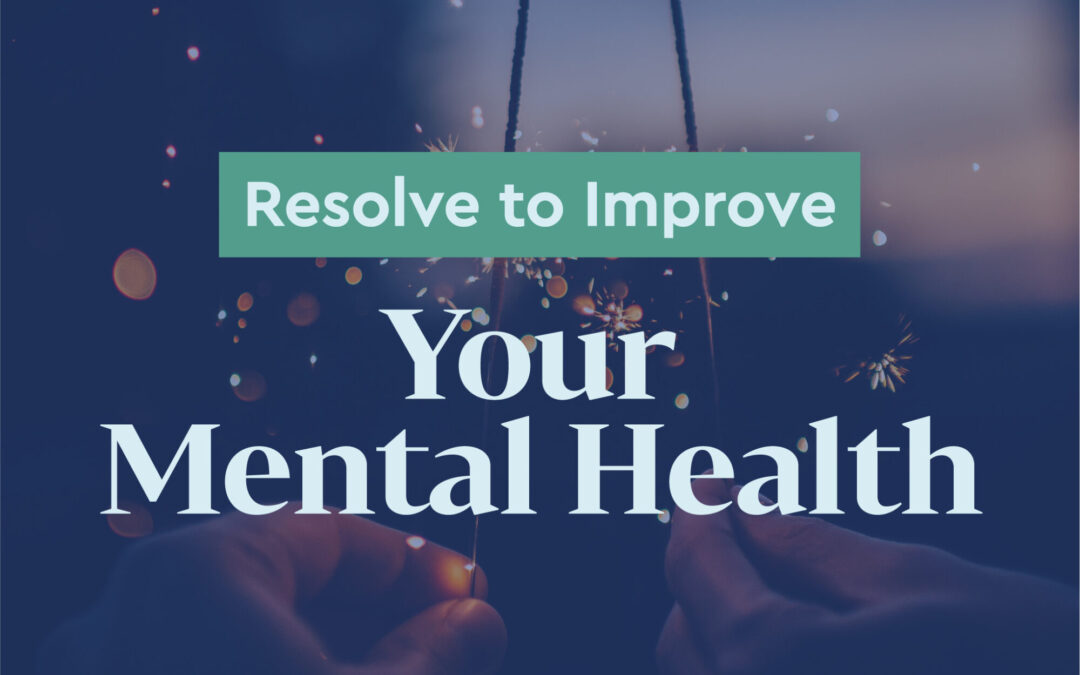It’s the time of year when many of us make resolutions to live healthier. Some of us set goals around physical health: going to the gym, eating better, etc… These are all great resolutions – but it’s also important to focus on our mental health in the new year.
So how do you do that? Just thinking about ways to improve mental health can be overwhelming — especially if you’re already experiencing a mental health challenge like depression or anxiety. The good news is that small changes can have a big impact.
Here are a few ideas to help kickstart your mentally healthier 2023! You don’t need to do them all. In fact, people are more successful when they try making just one small change at a time.
1. Establish a routine.
Having a consistent schedule can help you feel more grounded and in control of your life. It also helps you build in time to work on self-care. Your schedule doesn’t have to be super strict or down to the minute, but having some kind of routine will help you stay on track.
2. Get some exercise every day
Physical activity is proven to help improve mental health, and can even decrease symptoms of depression and anxiety. Exercise releases endorphins that make us feel happier and less stressed. You don’t have to work out for hours every day or push yourself to the limit. Just get moving, even if it’s only 15 minutes a day!
3. Eat well and drink enough water
Eating well can help us feel better, have more energy, and decrease stress levels. That doesn’t mean you have to totally change your diet overnight. Start by making a conscious effort to choose nutritious foods whenever that is an option. And don’t forget the water! To get proper hydration, try to drink at least 8 glasses of water each day – you can even set a reminder on your phone to remind you to sip some H20.
4. Limit your screen time
Did you know spending too much time on digital devices can lead to poor sleep habits as well as increased stress levels? Cutting down screen time can be particularly challenging, with how much we rely on our phones and computers. Think about the apps that distract you most often: are they absolutely necessary? If not, delete them. You may be surprised at how much more time you have – to spend doing off-screen activities instead.
5. Start a gratitude journal
Keep track of all the positive things in your life. It doesn’t have to be anything fancy, just write down 3 to 5 things that made you happy that day or week. This simple act helps us look for the good in each day, putting us in a better frame of mind. It also helps to read them back when things get tough – to remind us that there is always good in our lives.
6. Find a way to relax that works for you
Relaxing and recharging can help us take control of our stress levels. There’s no right way to relax. Just find whatever works with you – and make sure it’s something you can stick with. Meditation, going for a walk, listening to music, and starting a creative hobby are all good options to try. Have fun experimenting with different activities until you find something that sticks.
7. Make room for happiness in your life
It may not be realistic to cut out all the negative things and people in your life. Start by choosing to remove one negative influence that you can live without. You may be surprised at how much better you will start to feel when you are surrounded by positive, happy, and fun people and things. (Even just physically removing clutter from your space can help decrease your stress levels.)
8. Give yourself permission to prioritize your mental wellbeing, and heal
You are the most important person in your life! We understand that it can be hard to prioritize yourself, especially if you’re used to always putting others first. The truth is, your mental health affects everything else in your life – including your ability to be there for others. So it’s important to take your mental wellbeing just as seriously as your physical health.
9. Ask for support
If you’re feeling overwhelmed, don’t be afraid to reach out to friends and family members. Talking about what’s going on can help you feel less alone and more connected to people who care about you, and also help you feel more accountable to follow through with your mental health journey.
10. Get help
CareWell Health’s Behavioral Health services are here to help those struggling with mental health issues including depression, mood disorders, anxiety disorders, chronic suicidal ideation, co-occurring disorders (i.e. psychiatric and substance abuse/addiction disorders), psychotic disorders (i.e. schizophrenia), emotional distress/adjustment, anger management, and more.
Through the use of innovative treatments, therapies, and technologies like SPRAVATO® (a remarkably quick and effective treatment for those struggling with treatment-resistant depression) and genetic testing (which takes the guesswork out of prescription medication), our dedicated team aims to get you better, faster.
Call our Care Center at 973-266-8416 to take the first step toward a mentally healthier 2023.
CareWell Health: Be Treated Like Family.

